 |
|
Highlights from
Friday, 17 November:
 Delegates convened in contact groups to discuss text on: "best practices"
in policies and measures; guidelines under Protocol Articles 5 (methodological
issues), 7 (communication of information) and 8 (review of information);
land use, land-use change and forestry (LULUCF); development and
transfer of technologies; financial issues; capacity building; and
the financial mechanism. The Joint Working Group on Compliance (JWG)
also met to continue its work. In addition, negotiators met in closed
"informal informal" consultations and drafting group meetings to
advance negotiations on issues such as mechanisms, compliance, development
and transfer of technologies, adverse effects and LULUCF.
Delegates convened in contact groups to discuss text on: "best practices"
in policies and measures; guidelines under Protocol Articles 5 (methodological
issues), 7 (communication of information) and 8 (review of information);
land use, land-use change and forestry (LULUCF); development and
transfer of technologies; financial issues; capacity building; and
the financial mechanism. The Joint Working Group on Compliance (JWG)
also met to continue its work. In addition, negotiators met in closed
"informal informal" consultations and drafting group meetings to
advance negotiations on issues such as mechanisms, compliance, development
and transfer of technologies, adverse effects and LULUCF.
Above photo (L-R): Michael Zammit Cutajar (UNFCCC
Executive Secretary) and Jan Pronk (COP-6 President)
during a press conference yesterday morning.
|
Contact Group: LULUCF
|
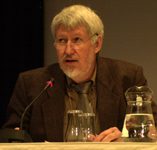 In an afternoon meeting of the contact group, SWITZERLAND,
on behalf of the ENVIRONMENTAL INTEGRITY GROUP, introduced
their proposed changes to the Co-Chairs' text, that would limit
credits for carbon sequestration due to windfall effects caused
by, inter alia, carbon dioxide fertilization, nitrogen deposition, age
structure effects of forests, and climate change. He said the proposal
involves the subtraction of a biome-specific threshold value for
windfall effects as well as a threshold value to account for other
uncertainties from any measured and verified sink credits, and applies
to all sinks under all relevant Protocol Articles in all commitment
periods. Right Photo: Andreas
Fischlin (Switzerland) In an afternoon meeting of the contact group, SWITZERLAND,
on behalf of the ENVIRONMENTAL INTEGRITY GROUP, introduced
their proposed changes to the Co-Chairs' text, that would limit
credits for carbon sequestration due to windfall effects caused
by, inter alia, carbon dioxide fertilization, nitrogen deposition, age
structure effects of forests, and climate change. He said the proposal
involves the subtraction of a biome-specific threshold value for
windfall effects as well as a threshold value to account for other
uncertainties from any measured and verified sink credits, and applies
to all sinks under all relevant Protocol Articles in all commitment
periods. Right Photo: Andreas
Fischlin (Switzerland)
|
Contact Group: Mechanisms
|
|
Closed "informal informal" discussions on
mechanisms were held throughout the day and late into the night with
the aim of seeking further convergence on the text. By late evening,
it is understood that while there had been steady progress in
"cleaning up the text," key decisions on many of the core issues
have yet to be taken. The contact group on mechanisms will meet on
Saturday morning to receive feedback on the informal discussions.
Left photo : Mechanisms Chair Kok Kee Chow (Malaysia) confers
with John Drexhage (Canada) while a member of the Secretariat
looks on.
|
Contact Group: Articles 5,
7, 8
The G-77/CHINA, opposed by the EU, said
inventory estimates of a year during the commitment period
that had been adjusted should not be revised and that
consequently, adjustments of estimates of both the base year
inventory and the inventory during the commitment period
could not be revised.
Right photo: G77/CHINA member delegates from Brazil,
Saudi Arabia and India |
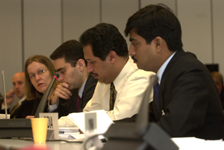
|
|
On the draft COP/ MOP-1 decision related to Article 5.2
(adjustments), the US suggested that adjustments
applying to a Party's base-year inventory estimates could
not be replaced by revised estimates subsequent to the
establishment of a Party's initial assigned amounts.
Right
photo: Member of the US delegation making an
intervention during a contact group session on Articles 5, 7,
8 |
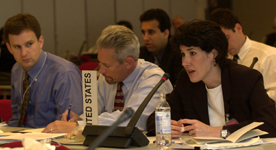 |
Contact Group: Policies and Measures
|
Delegates discussed the draft decision on P&Ms in
two sessions of the contact group, and also during informal
consultations held throughout the day. In the first contact
group in the morning, discussions focused primarily on revised
text relating to the decision that future work on P&Ms
should facilitate an assessment of "demonstrable progress"
of Annex I Parties in achieving their Protocol commitments.
CANADA argued that this issue is being examined in the contact
group on Articles 5, 7 and 8. With the support of JAPAN,
AUSTRALIA and the US, and opposed by the G-77/CHINA and the EU,
he proposed replacing the decision and its associated
initiatives with alternative text stating that consideration
of demonstrable progress cannot take place until the SBSTA has
considered the issue pursuant to the guidelines that may be
elaborated under Article 7.
Right photo: Member of the EU delegation making an
intervention at the Policies and Measures contact group |
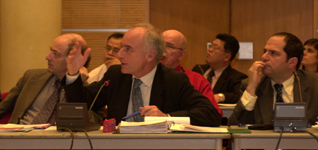
|
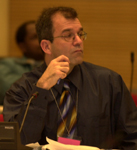
On the preamble, the US, JAPAN and CANADA,
opposed by the EU, SAUDI ARABIA and SAMOA, again
urged deleting reference to specific UNFCCC and Protocol
provisions.
Above photo: Delegate from Canada attending the Policies
and Measures contact group
Right photo: Members of the Japanese delegation at the P&M
contact group |
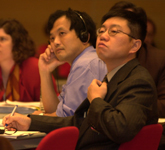 Although opposing retention of the listed initiatives,
JAPAN, the US and AUSTRALIA, opposed by the
G-77/CHINA, also provided amendments to the existing text
in case it should be retained, including: replacing text on the
assessment of demonstrable progress by 2005 with a request to
Parties to "continue sharing information"; replacing the requirement
to assess and minimize the adverse effects of P&Ms with a
requirement to facilitate information sharing on this issue;
and bracketing reference to the use of "quantitative criteria"
in reporting on P&Ms in national communications Although opposing retention of the listed initiatives,
JAPAN, the US and AUSTRALIA, opposed by the
G-77/CHINA, also provided amendments to the existing text
in case it should be retained, including: replacing text on the
assessment of demonstrable progress by 2005 with a request to
Parties to "continue sharing information"; replacing the requirement
to assess and minimize the adverse effects of P&Ms with a
requirement to facilitate information sharing on this issue;
and bracketing reference to the use of "quantitative criteria"
in reporting on P&Ms in national communications |
|
Contact Group: Financial
Mechanism
|
|
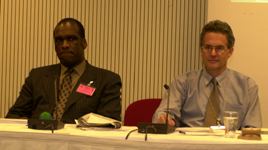
Co-Chair Kerry Groves (Australia),
welcomed delegates to the first meeting of this group, which he said
was mandated by COP-6 President Pronk. He explained that the group
had been established in the light of the various funding proposals
being discussed in contact groups, and said this group would provide
input that would assist President Pronk in preparing elements of a
framework to integrate the various proposals.
Left photo (L-R): SBI Chair John Ashe and Co-Chair
Kerry Groves (Australia)
|
|
 Delegates also discussed outstanding text requesting
the GEF to continue to provide financing, where appropriate, and
consistent with both the guidance of the COP and the GEF's mandate,
to support the implementation of the capacity building framework,
and to further support, enhance and implement the GEF's capacity
building activities in accordance with the framework. However, the
text remains bracketed. Delegates also discussed outstanding text requesting
the GEF to continue to provide financing, where appropriate, and
consistent with both the guidance of the COP and the GEF's mandate,
to support the implementation of the capacity building framework,
and to further support, enhance and implement the GEF's capacity
building activities in accordance with the framework. However, the
text remains bracketed.
Right photo:
Alan Miller (GEF) confers with a delegate during a break in
the contact group
|
| Press Conference: |
|
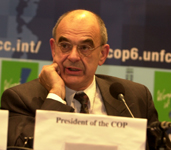 During
a press conference Jan Pronk (COP-6 President) reported on progress
made during the week's negotiations, identified outstanding issues
left to be negotiated by the ministers. He briefed the press on
the planned schedule for next week with the ministers. During
a press conference Jan Pronk (COP-6 President) reported on progress
made during the week's negotiations, identified outstanding issues
left to be negotiated by the ministers. He briefed the press on
the planned schedule for next week with the ministers.

RealAudio
of Jan Pronk's mid-COP assessment
RealAudio Questions on:
1. Availability on working draft for the Ministers
2. Composition of the Ministers in the GROUP of 6
3. Absence of the US in the GROUP of 6
4. Status of NGO and IGO
participation
5. Transitions in the
negotiation process
6. Areas of
difficulty
in contact groups
7. Page limit of the
agreement
|
|